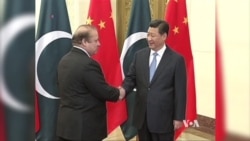Chinese President Xi Jinping visits Pakistan next week where the two countries are expected to agree on economic and energy deals worth more than $40 billion. Leaders are highlighting how the trip will transform the relationship to focus more on economic development, but it also could have significant implications for security challenges in both countries.
Xi’s state visit to Pakistan is the first time a Chinese leader has visited the country in nine years. Assistant Foreign Minister Liu Jianchao says the fact this is his first foreign trip this year highlights the importance Beijing places on developing Pakistan-China relations.
Liu says the Chinese president's visit “will seek to lay out a comprehensive plan for Pakistan-China relations and cooperation over the next five-10 years and take relations to a new level.”
Pakistan-China Economic Corridor
During the visit, they are expected to sign agreements, many of which are focused on the establishment of a megaproject the two are calling the Pakistan-China Economic Corridor. The corridor seeks to link China’s restive and remote western region of Xinjiang with Pakistan’s deepwater Gwadar port on the Arabian Sea.
In addition to the building of railways, roads and other infrastructure, the two will also sign agreements focused on energy, finance and science and technology. According to some media reports the projects could cost as much as $46 billion, a massive amount of money for Pakistan’s struggling economy.
A U.S. State Department official said the corridor plan is one “we very much support” and is aligned with a shared vision of regional economic connectivity.
“Fundamentally we hope that in the end it will not only be Pakistan and China,” the U.S. official said. “We hope eventually that will include other neighbors as well, particularly Afghanistan, where we and the Chinese are also making common effort.”
Since 2009, the United States has provided Pakistan with about $5 billion in civilian aid.
“We do not view this as a theater of competition. We have a shared set of interests in keeping peace, stability and ultimately economic prosperity,” said the U.S. official, “and that is built on a common set of concerns about terror safe havens and the potential that some of these areas across the border could ultimately threaten international security.”
A spokesman for Pakistan’s government says the visit will mark the transformation of relations from a global strategic relationship to a new type of economic relationship between the two countries. But the security side of the relationship is also expected to deepen.
China and Pakistan have long enjoyed robust security and military ties.
Beijing is Pakistan’s biggest supplier of military hardware and just recently reports have revealed plans that Islamabad is seeking to buy eight submarines from China, a key asset in Islamabad's long-running rivalry with New Delhi.
Security Challenges
On Beijing's side, authorities are deeply worried about unrest in Xinjiang, which is home to the country’s Uighur Muslim minority group, and has long sought Pakistan’s help in addressing the problem.
Critics say it is the Chinese government’s oppressive restrictions on religious and cultural practices of the Uighurs that is fueling the violence. But Beijing has linked violent attacks in Xinjiang and other parts of the country to a group believed to have a stronghold in tribal areas along the Pakistan-Afghanistan border.
Assistant Foreign Minister Liu Jianchao says Pakistan has been providing China with intelligence and support in its fight against the organization known as the East Turkestan Islamic Movement or ETIM. The group seeks the independence of Xinjiang, which it calls East Turkestan.
He says there are a considerable number of members of the group in Pakistan.
Liu says the "East Turkestan Islamic Movement is an enemy of both states and we will continue to increase our cooperation to fight terrorists, including those affiliated with the ETIM.”
Liu adds that “combating terrorism is in the interest of both countries."
As China and Pakistan push forward with their massive plans for the economic corridor, there are likely to be security challenges. Violent terrorist attacks are a regular occurrence in Pakistan and the country will reportedly be providing some 12,000 security forces to help protect Chinese workers on the projects.
Addressing Pakistan's security problems is part of China’s motivation for promoting the project, says Hoo Tiang Boon, an assistant professor with the China program at the S. Rajaratnam School of International Studies in Singapore.
“The idea is that they want to boost economic development in Pakistan. And if the Pakistan economy develops, then it would help reduce the problem of terrorism,” he said.
Hoo says that while that is the broad logic and intent of the plan, what is less certain is whether the plan will be successful.
Mary Alice Salinas contributed from the State Department.





